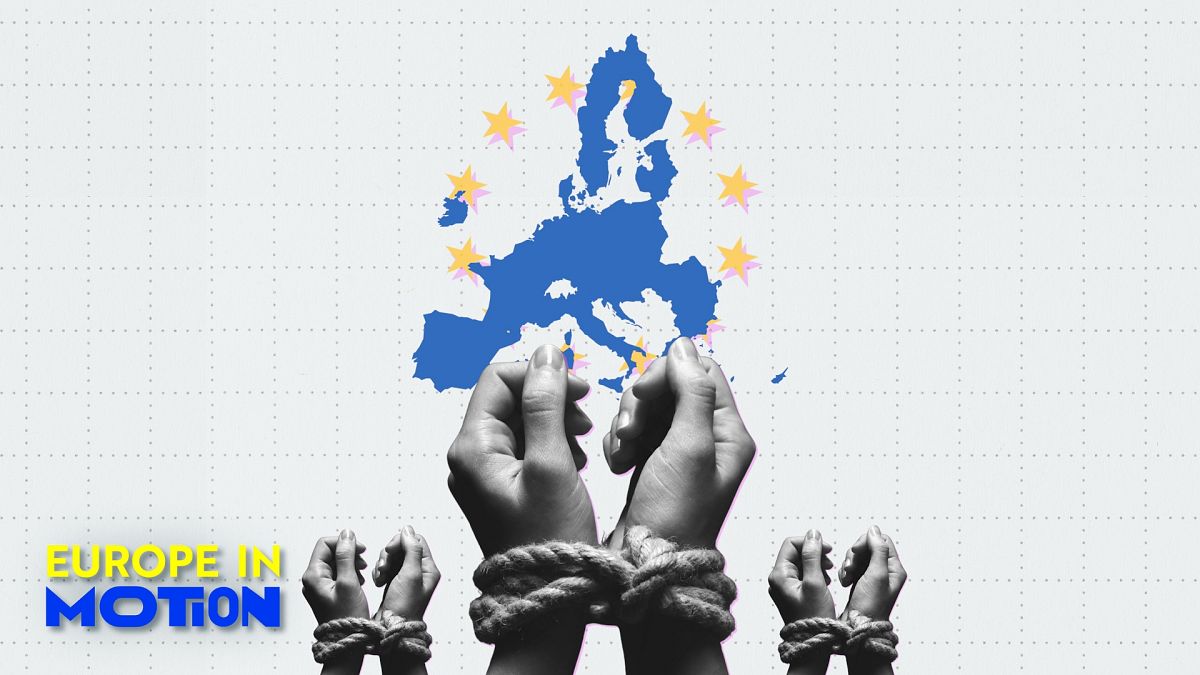Russian-American *Julia had wanted to leave the United States for a couple of years, but the start of President Donald Trump’s second term forced her to start taking the idea seriously.
"I noticed people who are immigrants [like me], they were a lot more worried after the election happened," she told Euronews Next. "We saw the warning signs right away".
The anesthesiologist worked on the frontlines of the COVID-19 crisis in New York City but now wants to find a job in pharmaceuticals or biotech somewhere in Europe.
Euronews Next agreed to change her name to protect her identity while she looks for work overseas.
Julia is one of dozens of people who posted on the Reddit channel Amer/Exit, a play on words referring to Brexit, the UK’s departure from the European Union. Like her, users of the subreddit are trying to figure out how to leave the US for Europe or Canada in the wake of Trump’s second mandate.
Experts say it’s "too early" to tell whether this could be considered a "brain drain" but that the EU needs to prepare.
'We just could not keep up with the calls'
Arielle Tucker is the founder of Connected Financial Planning, a company that helps Americans relocate to Europe.
Tucker received more than 30 new American clients in the week after Trump’s reelection, a level of interest that’s been sustained throughout the last few months.
Many of Tucker’s clients are in their mid-30s or early 40s and work in executive roles in tech, pharmaceuticals or finance.
"The overall sense that I got from a lot of those individuals was they felt like they couldn’t control anything and they had to do something," Tucker said. "We just could not keep up with the calls".
They are working for multinationals with offices in Europe or can self-finance their move from a major American city like New York, Los Angeles, San Francisco, or Boston.
Her clients thought about a move "passively" for a while but then they "realised they just do not like the political climate in the US".
Alex Ingrim, founder of wealth management firm Liberty Atlantic Advisors, said more clients are contacting him with their visa processes well underway.
His clients skew older, from the mid-40s to 60-plus who are either working "digital nomad" jobs in tech, venture capital, or planning for retirement.
"A lot of people feel that the longer they stay in the US, the more uncertain they are about what the quality of life is going to be and how that might affect their financial well-being," Ingrim said.
Where they go depends on what they do, Tucker said, but it’s often a game of "whack-a-mole" where they try to find the best immigration opportunity for their clients.
Countries like Spain, Portugal, Switzerland, and Germany are becoming especially popular with Americans, Tucker and Ingrim said.
Europe has a 'real opportunity' to market to Americans
Tucker believes European companies have a "real opportunity" to market to Americans to help them fill expertise in missing sectors, like the IT sector, AI, and pharmaceuticals.
But one of the biggest barriers for Americans coming to Europe is a change in their salaries, Ingrim said.
"You hear figures like in Paris, the salaries are a third of what they might be in LA or San Francisco," he said. "I think that’s a financial roadblock as far as how is this going to affect my future".
Federico Steinberg, a senior analyst for the economy and international trade at the Elcano Royal Institute in Spain, said that companies should be offering Americans higher wages or more benefits in their job offers like housing assistance to help them make the leap.
Steinberg said a clear long-term picture from the company for that person’s career past a five-year visa is also worthwhile.
"Europe, if it wants to become attractive, it has the potential," Steinberg said. "It has the work-life balance, it has the culture, the leisure part… so it’s all about the career opportunities".
It can also be complicated for Americans to move abroad because of a tax structure that makes it difficult for banks to work with them, Tucker added.
For example, if an American wants to save for retirement with a non-US pension, Tucker said there’s "often punitive US tax considerations around that".
There are some European financial services that are trying to create a market to support these Americans, Ingrim said.
"Before COVID-19 and before the first Trump administration, most financial services wouldn’t work with Americans because there weren’t enough of us here," he said. "Now I get calls about it every month".
To further mitigate this, Steinberg said the EU could consider a short-term tax incentive to attract top talent, like is already done for top athletes.
'I can imagine myself being there'
Back in NYC, Julia said she’s okay if the move takes them a year and a half to plan because she wants to weigh her decision carefully.
She’s considering Denmark, Germany, or Switzerland because she has transferable skills for many of their pharmaceutical jobs.
Her parents are also planning their retirement in Portugal, so moving to Europe would bring her closer to them.
She’s worried, however, that a new move could leave her feeling isolated, lonely and lost, even though she wants to settle in a vibrant city where she could meet new people.
Despite these issues, there’s very little that would convince her to stay, except for if the "whole administration gets impeached or fired".
"I can imagine myself being there [in Europe]," she said. "I feel excited when I look at the job postings".
*The interviewee’s name was changed at her request to preserve her anonymity.

 1 day ago
3
1 day ago
3






 We deliver critical software at unparalleled value and speed to help your business thrive
We deliver critical software at unparalleled value and speed to help your business thrive






 English (US) ·
English (US) ·